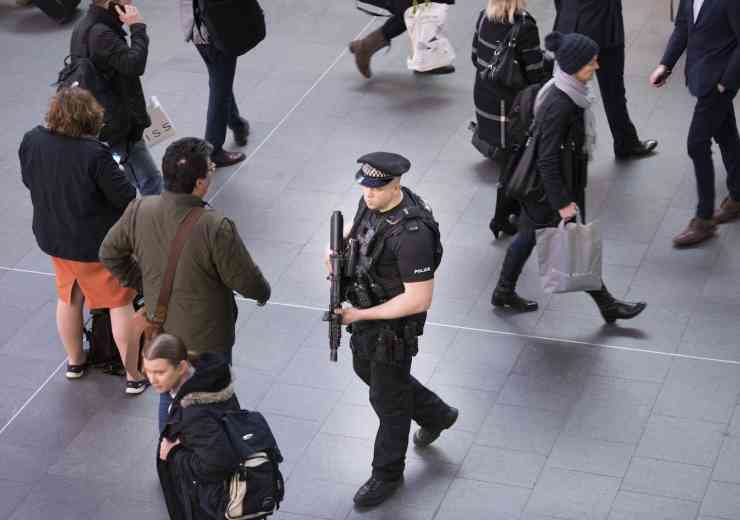
Current national security challenges
Professor Anthony Glees, director at the Centre for Security and Intelligence Studies, part of the University of Buckingham, explores the current security threats to the UK, and how security should be maintained in Brexit negotiations Speaking on 15 September 2017, after the latest terror attack in the UK, Home Secretary Amber Rudd said that 2017 had so far been ‘a year like no other’: Britain had been hit by five terrorist attacks in nine months, the Security Service (MI5) and counter terrorist police had disrupted a further six plots but were immersed in 500 counter terrorist operations. Earlier this summer, Security Minister Ben Wallace, disclosed that there were now 23,000 potential jihadists in the UK - 20,000 more than the previous estimate provided two years earlier. This is just the threat Britain faces from Islamism. We are also challenged by neo-Nazism. By the end of September, 14 people, including two members of our armed forces, were arrested on neo-Nazi terrorism and two neo-Nazi groups, ‘Scottish Dawn’ and ‘NS131’, were proscribed (‘National Action’, their predecessor, was banned in 2016, following the killing of Jo Cox MP by a member). To date, the British government has banned 71 organisations in all, of which 70 have an international presence, proscribed under the Terrorism Act 2000, with a further 14 banned in Northern Ireland. That the threat from terrorism to Britain’s national security is currently set at ‘Severe’ is hardly surprising (in September it reached the highest level, ‘Critical’, for a short time). Yet home-grown Islamist and neo-Nazi terrorism are not the only security challenges the UK now faces. As we leave the European Union, whether in ‘soft’ or a ‘hard’ mode, we are, in security terms, entering decidedly choppy and uncharted waters. Some of these threats have to do with the transnational nature of external Islamist and neo-Nazi terrorism and the self-evident truth, fully accepted by the Prime Minister, that they require both national and Europe-wide cooperation if they are to be withstood. Others stem from the perceived and actual current position of the UK at a time of huge transition and volatile domestic politics: this must be a trigger to ‘predators’, whether states - particularly Russia, who sees a straightforward political advantage to itself in promoting instability and division - or sub-state external actors including serious organised criminals. The Brexit effect In the future, Britain will become even more vulnerable if Brexit does not follow the government’s current chosen path as outlined in the Prime Minister’s Lancaster House speech and, more clearly and attractively, to the EU27 in her Florence speech. A ‘global’ UK, entirely cut out of any EU connection after March 2019 will become even more vulnerable to attack because we will lack the support of EU-promoted agencies, with whom we have previously been joined at the hip, and because if the UK becomes initially less prosperous, there will be less cash for security. Prior to the Brexit vote in June 2016, May, then Home Secretary, had declared that ‘remaining a member of the EU means that we shall all be more secure from crime and terrorism’ and that ‘leaving the EU did not mean we would be as safe as if we remain’. Outside the EU, she said, we would have no access to the European Arrest Warrant which had allowed the UK to extradite 5,000 people since 2011 and bring 675 suspects or convicts to the UK. Britain had used the EU Schengen Information Database System 514,160,087 times in 2016. There are some 70 billon items in the Brussels database tracking 28,472 persons of interest to British intelligence, 1768 firearms and 113,414 vehicle records. There are still other vital national security challenges to be addressed by a Brexiting Britain: mainly how to control immigration into Britain from myriad of ports and minor airports as well as major hubs, and how to police the new borders with the EU27 that will have to be constructed. Whilst the government may insist that a ‘seamless border’ is possible in Northern Ireland, in reality this is a meaningless oxymoron. Borders cannot at once be borders and ‘seamless’; IT cannot counter smuggling, illegal immigration or serious organised crime because it cannot do so now (indeed IT often promotes it). So what is to be done? In respect of the Brexit-related challenges, one answer would indeed be provided if the Prime Minister’s security offer were accepted by the EU27 and the European Commission. It should be. Theresa May is plainly keen that we should continue to have an effective security and intelligence relationship with the EU27 after Brexit. This is not just because the UK’s obvious strength in this sector is a bargaining chip in the trade negotiations with the EU27, but because she understands the vital importance of the security relationships that function within the umbra of the EU. Indeed, this is so important to her that in her Florence speech of 22 September 2017 she offered not just a new security treaty with the EU27 but said the UK would be ‘unconditionally committed’ to this. But Brexit, whether hard or soft, inevitably means the UK will be required to leave INTCEN, the Open Source (OSINT) Division, the EU Situation Room and the Consular Crisis Management Division as well as the Counter-Terrorist Group (Whitehall Briefing, 2016). The UK will also have to quit Europol which is now an EU institution. Britain will no longer participate in the Common Security and Defence policy, the Political and Security Committee, the EU Satellite Centre (SATCEN), Galileo, as well as a host of OSINT research groups, such as the Single Intelligence Analysis Capacity. If Brexit is soft, the UK could apply for re-entry. However, all these bodies require members to accept the ultimate jurisdiction of the European Court of Justice. As the UK government’s refusal to do so is a ‘red line’, it is hard to see how Britain will have these resources at its disposal after 2019. We will therefore have to do these things alone, as best we can. In respect of the fight against home grown extremism and terrorism, the first thing the government needs to do is to deliver measures it already has at its disposal whilst developing new ways of combating jihadism. It should increase the number of counter terrorist police and the size of MI5 as speedily as possible, as both major UK parties promised during the election. It must also develop new strategies to contain what looks increasingly like an endemic spread of jihadism amongst Britain's young Muslims where one ‘success’ energises others to try their hand at terror. All will have to be carefully targeted and intelligence-led if the increase is not to become exponential. Large number of immigration officers will be needed and, in the case of Northern Ireland, there are both land and sea borders that must be controlled if the smuggling of people and goods from the EU into Northern Ireland, and thence into the UK, is to stand any chance of being prevented. Budget cuts to the police will need to be reversed and increased funding to intelligence-led agencies maintained. Other measures of control are now required and the ‘Prevent’ counter extremism policy, far from being scrapped, should be extended, to involve MI5 in the process to ensure targeting is as successful as possible. The legal apparatus exists in the form of the Investigatory Powers Act 2016. Prevent has, in fact, frequently worked: in 2015-16 7,500 people were referred to Prevent, 20 a day, and it is thought at least 150 people were stopped by it from travelling to join ISIS. Finally, in respect of Russian subversion, the 1989 Security Service Act placed on MI5 the statutory duty of ‘protecting national security…from actions intended to overthrow or undermine parliamentary democracy by political…or violent means’. MI5 must get cracking on this as well.
















